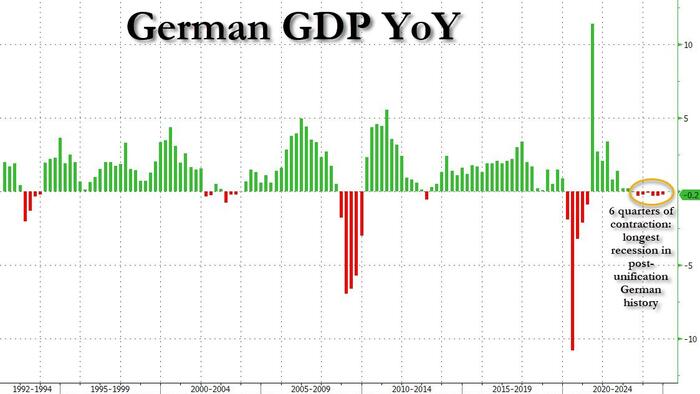Germany’s Economic Struggle Simplified: 3rd Year of Recession & Why Trump’s Policies Are in the Spotlight
Germany, once Europe’s economic powerhouse, is now battling its longest recession since reunification in 1989. Here’s a breakdown of what’s happening and why it matters:
The Situation
- 3 Years of Shrinking Economy: Germany’s economy has gotten smaller for 6 straight quarters (1.5 years). If this continues through 2025, it’ll mark the country’s first-ever three-year recession.
- New Forecast: The government now expects zero growth in 2025 (down from a previous 0.3% estimate).
Why Is This Happening?
-
Trade Wars & Trump’s Tariffs:
- The U.S. imposed taxes (tariffs) on German exports like cars, steel, and aluminum, making them more expensive for Americans to buy.
- Germany relies heavily on exports, so this hurts businesses and jobs.
-
Energy Costs Skyrocket:
- After losing access to cheap Russian energy (due to the Ukraine war), German factories face higher bills, making their products less competitive globally.
-
China Competition:
- Chinese companies are making cheaper alternatives to German goods (like cars and machinery), stealing market share.
- Stagflation Strikes:
- Stagflation = Stagnant economy + High inflation.
- Prices are rising (2% inflation), but the economy isn’t growing. Unemployment is also climbing (from 6% to 6.3%).
What’s Germany Doing?
- Scrapping Budget Rules: Germany relaxed its strict borrowing limits to fund military and defense projects, hoping to stimulate the economy. Critics call this a risky “debt spree.”
- Begging for Trade Peace: Germany urges the EU and U.S. to resolve trade disputes but also wants the EU to prepare retaliatory measures if talks fail.
The Bigger Picture
- Euro’s Strength: A weaker euro could make German exports cheaper globally, but the currency remains strong, partly due to U.S. economic policies.
- Lost Hope in Leadership: The incoming government, led by Friedrich Merz, promises growth, but experts doubt it can reverse the decline.
Key Takeaways
⚠️ Germany’s Challenges:
- Longest recession in modern history.
- Rising costs, weak global demand, and fierce competition.
- Political frustration over U.S. trade policies.
⚠️ What’s Next?
- More economic pain in 2026 (growth forecast cut to 1%).
- The European Central Bank might slash interest rates to negative levels to boost spending—a risky move.
In Simple Terms: Germany is stuck in a vicious cycle of high costs, weak sales abroad, and global trade tensions. Blaming Trump’s tariffs is part of the story, but deeper issues (like energy and competition) are at play. Without major fixes, Europe’s former “growth engine” risks becoming its “sick man” for years to come.

